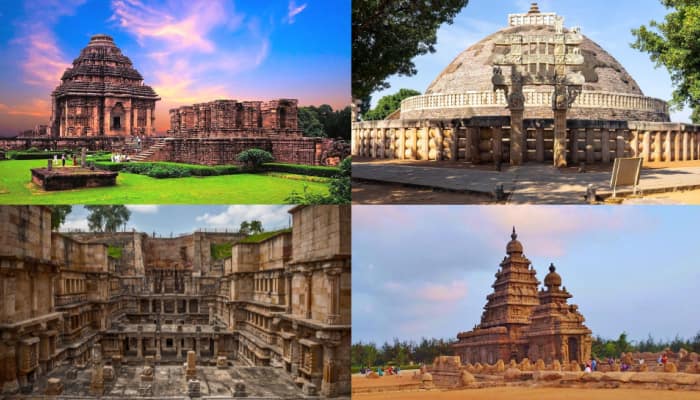Life Is Music: Abhay Nayampally—Rebel with a cause
A musical initiative-Life Is Music- brings together musicians to rejuvenate your souls. Master percussionist Taufiq Qureshi along with Louiz Banks and Purbayan Chatterjee launched the musical extravaganza on Monday 15th June 2015. This musically-rich initiative is a platform for artists from across all age groups to come and explore their creativity and share their music with patrons of this melodious art form.
)
New Delhi: A musical initiative-Life Is Music- brings together musicians to rejuvenate your souls. Master percussionist Taufiq Qureshi along with Louiz Banks and Purbayan Chatterjee launched the musical extravaganza on Monday 15th June 2015. This musically-rich initiative is a platform for artists from across all age groups to come and explore their creativity and share their music with patrons of this melodious art form.
In an exclusive interview, Yoshita Sengupta speaks with Ratan Bharati to know what it takes to be a musician at this age, the challenges that one faces while trying to pursue the same and the efforts that it takes to be a musician.
With an ambition of making playing Carnatic music on the Guitar a mainstream practice, this Pune-based musician is making a habit out of breaking conventions
At the age of six, when he was asked to not to play the Keyboard without adult supervision, he did exactly that. At the age of around 10, he would skip meals in the school canteen, collect the food allowance through the week, bunk school and travel all the way to Rhythm House in Fort from Goregaon to buy himself a Mozart or a Beethoven CD. As a teenager, in an age without YouTube and with no access to tutorial books, he would often spend sleepless nights teaching himself Guitar chords. As a student in Fergusson College in Pune, he was seldom found in class; playing the Guitar sitting on top of a hill behind college was his idea of education. He was doing well at Jazz shows, but he decided to quit and follow his leaning towards Carnatic music. He was advised to approach Prasanna, who plays Carnatic music on an Electric Guitar, but he chose to approach and train with Mandolin virtuoso Late U Srinivas. Excerpts from an interview with the rebel, Abhay Nayampally;
When did you first pick up any instrument?
The first time I played anything was at three – the Keyboards and the Tabla. The Keyboard I largely taught myself. For Tabla I would go to someone to learn but I didn’t pursue it for long.
Do you come from a family of musicians and artists?
Dad and mom used to sing, they still do. My dad used to compose and write songs as well. They are trained in Indian Classical.
What was the association with music, growing up? How did you discover the Guitar?
I remember my dad had got this small Keyboard for me. He had given me strict instructions to not touch it when he wasn’t around. I obviously did not follow that. I used to spend a lot of time pottering around with it, trying to figure out harmonies etc. At that time, I discovered that if I played a C note with a C, it is one color; C note with an F was another color, and so on. That is when I first came to know how music works – the understanding was of course at a very basic level. Music had started piquing my interest. That is when I started moving on to other instruments. Along with the Keyboard, I also started with Western Classical Music.
I was in class six when I first picked up a Guitar. It was at a friend’s place. We used to go there to play tennis and cricket, but I found myself spending more time sitting at his home playing the Guitar. That’s when I fell in love with the instrument.
Did you train to play the Guitar?
It was completely self-taught. Back then there was no internet and I didn’t have any tutorial books either. But I knew about chords on the Keyboard and I knew how the Guitar was tuned. I would sit, sometimes the entire night, to figure out how the Keyboard chord would be on the Guitar. That is how I learned my chords. Learning that way was good because I knew my way around a Guitar, I understood its anatomy better than I otherwise would have.
Did you get a lot of support from home?
My parents have always been very supportive of me pursuing music. Even at a point when I wanted to take up a job because I had no money, they offered to support me and asked me to carry on with music. ‘Don’t get stuck with a job because you will waste time and be neither here or there,’ they had said.
How old were you when this happened and what job were you planning on taking up?
I was about 21 or 22 years-old. I was willing to take up anything that came my way. I wasn’t really qualified for a job. I graduated in literature because it was the easiest thing to do. I always wanted get into music. I studied in Fergusson College in Pune and the campus has a hill at the back. I would go right on top of the hill with my Guitar, very early in the morning, and practice. That was my college education.
Other than parents, did you have any other musical influences around you while you were growing up?
I didn’t have too many friends who were into music but I had a lot of music with me – cassettes and CDs. My mom and dad used to give me money to eat in the canteen; I would save it up, skip eating until I had about Rs 60. Then I would bunk school, back then we lived in Goregaon, and travel to Churchgate, go to Rhythm House and buy Beethoven, Mozart cassettes. I was heavily into Western Classical Music back then.
I had managed to make quite a huge collection. I still have it at home, even though I don’t have a cassette player. I was always surrounded by that music. Even when I slept at night, I would play a cassette, put on my headphones and sleep till the cassette stopped.
When did you start wanting to perform on stage, professionally?
I must have been 16 or 17 years-old. I had always wanted to perform on stage and when I felt ready, I felt ready. Whatever I am doing, whatever I am playing, whatever I am trying to express through my instrument, I want to do it in front of people.
There’s a difference between wanting to do something and knowing you are ready.
I am very critical about myself. Unless I feel very ready I don’t do it. At that point in life, I felt I was ready. I think becoming a professional musician was my destiny, things started coming my way. I started meeting musical people, through networks, friends. Right after college I took up a job in Bangalore, the only time I have done a 9 to 5 job. I was at a point where I was neither here nor there. I didn’t have a career and wanted to earn some money.
There was an institute in Bangalore where they taught a lot of different things – personality development etc. Music was also a part of it. I was heading music training but I was actually doing personality development – going to colleges and delivering motivational speeches. When I look back, I can’t believe I did that because I need motivational speeches myself.
How did you land the job and how did you get out of it?
I knew the head of the company, a couple. It wasn’t a very corporate place. They had met me somewhere and found that I could fit in with their system. I took it up. It was the only time I’ve been a bit disciplined in life. I used to wake up at 4 am, practice a little, do yoga and board a bus at 7 am and reach work by 8 am. After two-and-a-half months I started to get frustrated. One day, I walked into work frustrated and almost in tears and said, ‘This is not what I want to do, teach E major to a kid, who can barely hold the Guitar’. I had a lunch break at about 1 pm. I didn’t have lunch, I just took an hour-long walk and I had an epiphany – ‘*&#% this shit’. I need to get on stage and play music. That’s what I need to do. I went back to the office, walked straight into my boss’s cabin and told him that he had a nice office but it wasn’t for me. That afternoon, I went back home, packed my bags, booked a ticket for Pune and moved lock stock and barrel.
What happened in Pune, once you were back?
I started meeting up with a few artists around and joined my first band, a rock band. Then I started doing a little bit of fusion, I even played the Bass. That’s when I started taking a lot of interest in Jazz, especially John McLaughlin and his style of playing. I started incorporating that school of thought into my playing and I started getting calls for Jazz Fusion concerts, where they mixed Hindustani Classical with Jazz. That’s when I realized that fusion and everything else is fine but Indian Classical is where I truly belong.
How did you start playing Carnatic music on the Guitar? I haven’t come across too many people who do.
I had always been listening to Carnatic; I loved it – something about that music always made me feel at home. I remember this one night, when I was sitting up and thinking, ‘I’m a good Guitar player and wanted to grow. Whatever I am doing it is not special – if I go into the world market there are a million others like me, and that didn’t go down well with me. I wanted to do something different. That’s when I started paying attention to my love for Carnatic music. The Guitar is my favorite instrument, Carnatic is my favorite music. Why don’t I put these together.
I am majorly influenced by my guru, the late Mandolin player U Srinivas and wanted to try that style out on my Guitar. Carnatic music is quite impossible to play on the Mandolin, so on the Guitar it is even more difficult. I started trying those things out on the Guitar – the gamakkas etc. I used to listen to music a lot – about eight to nine hours a day – to get the feel of the music. To translate the music onto my fingers, I need to do something more. Eventually I met my guru. By then, I had already started playing a little bit of Carnatic music on the Guitar. I asked him I could come and learn with him. He agreed. I used to go to Chennai very often and stay there and learn with him. I got one on one long sessions with him.
But, I learnt to play Carnatic music on the Guitar on my own for two years before approaching him. A lot of people told me to approach Prasanna, but for some reason I always felt more connected to U Srinivas. It’s perhaps some past life connection. I always looked up to him as my guru and that’s what eventually happened. I had the privilege to train under him.
Where did you meet him?
I met him at a concert in Pune. Before the concert, I went to the green room and we had a nice short conversation. It was destined; I just went there and said I wanted to speak to U Srinivas for five minutes. I did and he told me to come to Chennai and the following month I went there. By then I got my basics in place, I wasn’t a complete novice. I didn’t want to be a complete novice and ask him to teach me the basics. He didn’t teach me the instrument, he taught me the music, the instrument I picked up on my own.
How long did you train with him?
About five to six years. He always spoke about how we could do something together, but that didn’t happen because of his premature death.
How did you go about establishing yourself as an artist?
Because of my previous Jazz and Fusion shows, I already had a foothold in the industry by that time I learnt to play Carnatic music on the Guitar. But I wanted to quit all of that. There came a day when I just started saying no to gigs. It was a risk. I was considering taking up a job again. My parents told me to focus on my Classical Music and eventually things picked up. When I was playing fusion music is when I had made Classical Music contacts. When I started playing the Carnatic Guitar, the one advantage that I had was that I was the only guy doing that. That is one advantage that I still have.
Sukumar Prasad in the ‘70s was the first person to play Carnatic music on the Guitar, he has vanished now. Prasanna popularized the Guitar to an extent. It is not an instrument that is regularly used in Carnatic music, I want to make it mainstream, like my guru did with the Mandolin.
I want to create a new style of Carnatic Guitar playing. I don’t want to follow Prasanna and I am very clear about that.
My one and only influence is U Srinivas and if at all I’ll play in his style, but on the Guitar.
In terms of a music career, how are you placed?
I am recording now and I’ve done it for movies. The first time ever in Marathi cinema history, the Carnatic Guitar was the main theme background motif for the entire score. It was for a movie called Anumati starring Vikram Gokhale. The music was by Narendra Bide. He wanted to do something different, other than the Sarod-Sitar-Violin score and that project turned out very good. The music was really well-received and even won a few awards. In the pipeline is a Marathi film that I am going to be scoring and giving the music.
Stay informed on all the latest news, real-time breaking news updates, and follow all the important headlines in india news and world News on Zee News.
Live Tv







)
)
)
)
)
)
)
)
)
)
